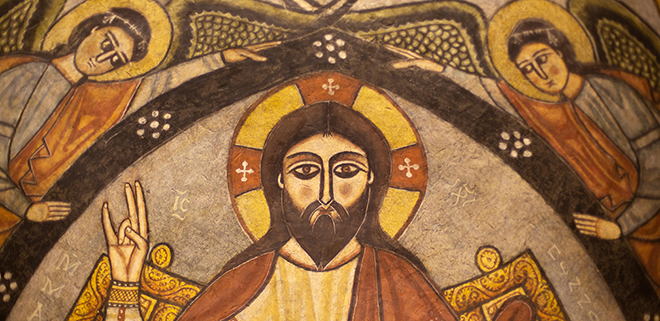In the past, scholars have often considered apocryphal writings in Coptic as a relatively marginal phenomenon in Egyptian Christianity. However, there is much to suggest that these writings were of great importance to the Christian population of Egypt. A new research project will shed new light on nearly 1,000 years of dramatic changes in Egyptian religion and society.

Painting from the monastery of St. Anthony in Egypt. The painting shows Christ flanked by the archangels Michael and Gabriel. Photo: Hugo Lundhaug
Every year, the EU allocates project grants to top researchers in Europe through the European Research Council. This year's Consolidator Grants were announced on 10 December, and on the exclusive list of projects that have received funding, we find the project Storyworlds in Transition: Coptic Apocrypha in Changing Contexts in the Byzantine and Early Islamic Periods (APOCRYPHA), led by Professor Hugo Lundhaug.
Facts about the grant:
Consolidator Grants (CoG) are awarded by the European Research Council (ERC). The APOCRYPHA project will run over five years, and the grant from the ERC amounts to a total of 2 million Euros. The project will employ three postdoctoral fellows for three years each, and one PhD research fellow, in addition to Lundhaug himself as principal investigator (PI) leading the project. The project will begin in August 2020.
The grant awarded to Lundhaug is prestigious. To apply for a so-called Consolidator Grant you must have between seven and twelve years of research experience after receiving your doctoral degree. Applicants must have shown great potential as researchers and their research projects must satisfy very stringent requirements. This year, a record total of five projects at the University of Oslo received this grant (out of a total of eight in Norway as a whole).
Despite the fact that the eye of the needle is narrow, this is the second time Professor Lundhaug has received project funding from the EU. With a so-called ERC Starting Grant, he conducted the research project called New Contexts for Old Texts: Unorthodox Texts and Monastic Manuscript Culture in Fourth and Fifth-Century Egypt (NEWCONT), which was completed in 2016.
Dean Aud V. Tønnessen says she is very happy about this grant.
'First and foremost, I would like to congratulate Hugo Lundhaug on the project grant. The effort behind it is impressive, and it takes a lot of hard work to meet the requirements for getting an ERC grant.'
'This is of great importance to the faculty and the University of Oslo. It contributes profoundly to the development of the faculty and to strengthening our international position as an outstanding research institution', Tønnessen says.
Rector Svein Stølen of the University of Oslo says he is particularly pleased that the awards demonstrate that UiO is a very strong breadth university, with five Consolidator Grants to five different faculties.
'The ERC grants are very prestigious, and that UiO has now hit an "all time high" in the number of grants received tells me that we have outstanding scholars who are successful and who are getting good help from our research administration', Stølen says.






